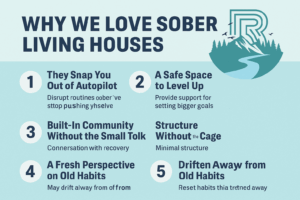You’ve been sober for a while. People congratulate you. They call you an inspiration. Maybe you even mentor newcomers. From the outside, you’ve got the kind of stability people in early recovery dream about.
But if you’re being honest, something’s missing. You’re not in crisis, but you’re not exactly fired up about life either. Days blur together—work, errands, sleep, repeat. The excitement that fueled your early sobriety has faded, and even meetings feel like going through the motions.
At River Rocks Recovery, we see this more often than people think. Long-term recovery isn’t just a straight climb upward. Sometimes, you plateau. And sometimes, you need to do something bold to shake yourself out of that flat, disconnected space.
One way people have found to re-ignite their sense of purpose? Moving into a sober living house—even years after leaving treatment. It’s not the usual path, but it can be a powerful one. Here’s why we love sober living houses, and why they might be the jumpstart you didn’t know you needed.
1. They Snap You Out of Autopilot
Autopilot is recovery’s quiet trap. You’re not drinking or using, but you’re also not intentionally building anything new. Without realizing it, you’ve stopped pushing yourself.
Sober living disrupts that loop. Suddenly, you’re accountable to more than your own calendar. There are check-ins, shared meals, and house responsibilities. You don’t just float through the day—you actively participate in it.
We’ve watched people who felt “meh” for years light up again within weeks of moving in. Not because sober living is magic, but because it breaks the monotony and demands presence.
2. Built-In Community Without the Small Talk
One of the hardest parts of long-term recovery is maintaining meaningful connections. In early sobriety, you might have had a tight-knit group from treatment or meetings. But over the years, life happens. People move away. Relationships shift. The urgency of those bonds fades.
In sober living, you skip the surface-level stuff. You’re around people who understand the language of recovery, the humor, and the weight behind certain silences. You don’t have to explain why you avoid certain places or why you’re not “just having one.”
It’s not about clinging to the past—it’s about having a circle that gets it without you having to translate.
3. A Safe Space to Level Up
Early recovery is about survival. Long-term recovery is about expansion—figuring out what you actually want your life to look like now that you’re not just trying to stay alive.
Sober living houses give you the space to set bigger goals and the structure to follow through on them. Want to go back to school? Start a business? Train for a race? You’ve got built-in accountability and encouragement from people who are rooting for you without the competitive edge that sometimes sneaks into friend groups.
One resident told us, “It wasn’t about staying sober anymore—it was about finally living like I meant it.” That shift can be game-changing.

4. Structure Without the Cage
You’ve earned your independence. You don’t need—or want—a rigid daily schedule like you had in treatment. But let’s be real: total freedom can sometimes turn into stagnation.
A Sober Living Program in Hamilton, Ohio offers just enough structure to keep you moving forward without making you feel boxed in. Morning check-ins, house meetings, and shared chores keep you engaged, but your time is still largely your own. You can work, study, travel for short trips, and still have a stable home base that supports your recovery.
Think of it like guardrails on a scenic highway—you still get to choose your speed and direction, but you’ve got something there to keep you from veering too far off track.
5. A Fresh Perspective on Old Habits
It’s easy to drift into habits you’d never have tolerated early in recovery—skipping meetings, neglecting your health, avoiding real conversations. Alone, these habits feel small. Together, they can quietly pull you away from the connection and growth that recovery thrives on.
Moving into sober living is like holding up a mirror. You see where you’ve been coasting and get the chance to reset in a space designed for growth. The people around you are also making changes, so momentum becomes contagious.
It’s not about going backward—it’s about creating a fresh chapter in a story you’ve been writing for years.
Why Sober Living in Middletown, Ohio Works
Location matters. In Middletown, you get a balance that supports recovery: a slower pace, plenty of community resources, and enough distance from high-risk environments.
Many of our residents love the access to the Great Miami River trails for walks or runs, the local coffee shops where they can journal or read, and the smaller-town feel that makes it easier to stay grounded. You’re close to Cincinnati and Dayton if you need the city, but far enough away to focus without constant distraction.
Real Voices from Sober Living
“I thought I was just coming here to help a friend out for a few months. Turned out, I was the one who needed the reset.” – Alumni, 4 years sober
“It’s not a step back. It’s a step sideways that helped me see forward again.” – Alumni, 6 years sober
FAQs About Sober Living for Long-Term Alumni
Isn’t sober living just for people fresh out of treatment?
No. While many residents are early in recovery, more and more long-term alumni are choosing sober living as a way to re-engage with community and personal growth.
Will I lose my independence?
Not at all. Sober living is structured but flexible. You’ll have guidelines and responsibilities, but also the freedom to work, study, and manage your own schedule.
What if I don’t “need” it?
Needing it isn’t the only reason to do it. Many alumni join sober living because they want the energy, connection, and structure it provides—not because they’re in crisis.
How long should I stay?
There’s no one-size answer. Some stay a few months to reset; others stay a year to fully build new habits and goals.
What if I’m already stable?
Stability is great—but stability can also get stale. Sober living can help you move from stable to thriving.
Bottom line: Sober living houses aren’t just a safety net for the newly sober. They can be a launching pad for long-term recovery veterans who feel stuck, restless, or ready for more.
If you’ve been waiting for that spark to come back on its own, maybe it’s time to go find it.
Call (888) 905-6281 to learn more about our sober living services in Middletown, Ohio.




























